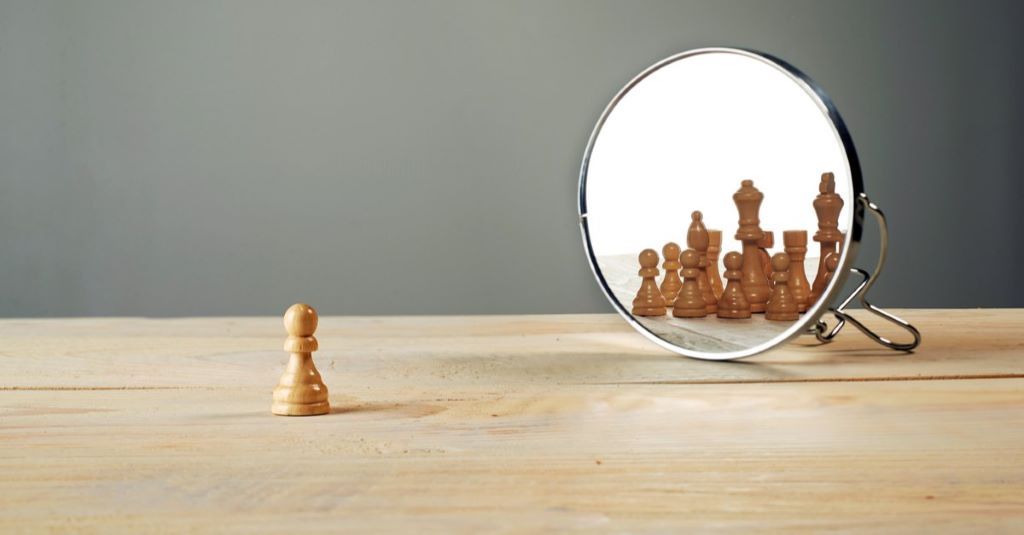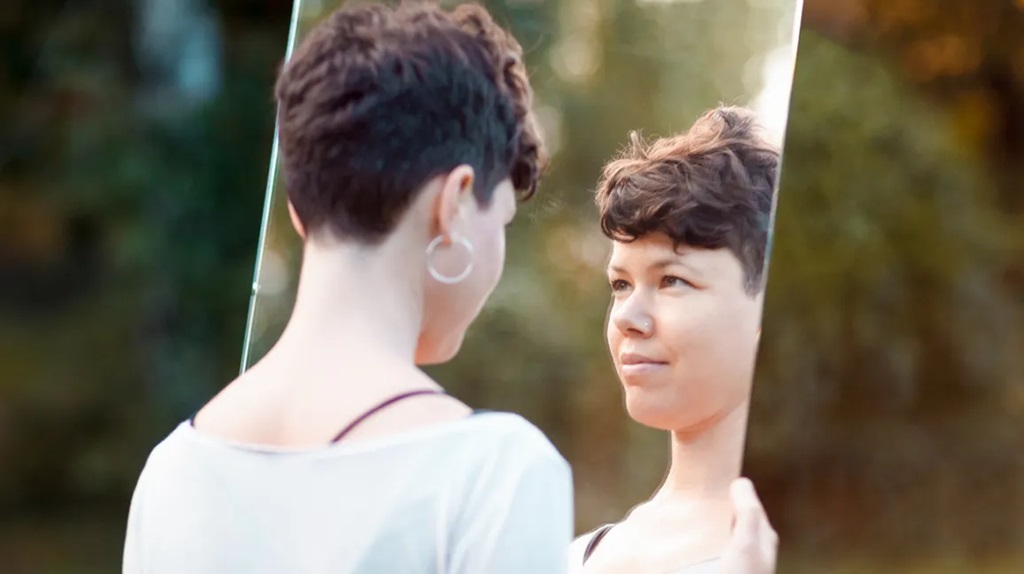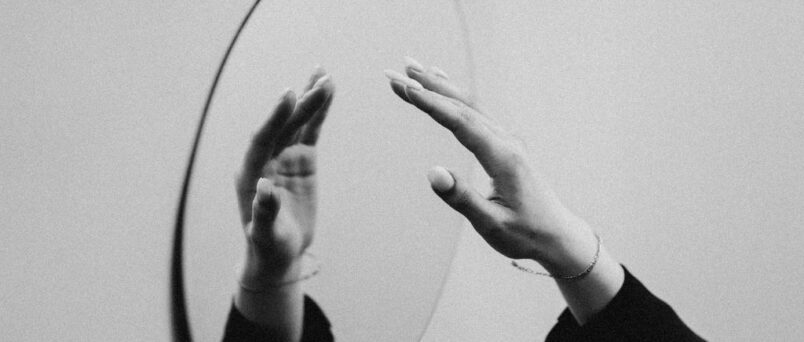While staring at your reflection in the mirror is often associated with narcissism and vanity, it is interesting to note that this simple act can have profound psychological and emotional effects. Observing oneself in the mirror can trigger a range of emotions, from self-doubt and insecurity to self-acceptance and self-love.
It can also help individuals to gain a deeper understanding of their own identity and personal values. Additionally, looking in the mirror can be used as a tool for self-reflection and introspection, allowing individuals to examine their thoughts, feelings, and motivations more closely. This makes it a valuable practice for personal growth and development.
A Tool for Self-Discovery

Mirror gazing has long been used as a tool for self-discovery. The famous philosopher Socrates reportedly said, “Know thyself.” One way to do that is by studying your reflection.
When you look into a mirror, you’re invited to notice the unique contours of your face. The way your eyes crinkle when you smile. The curve of your lips and nose. This helps you see your singular beauty.
Beyond appearance, mirrors reveal truths about your inner world. What do your eyes convey in this moment? Are they bright or tired, peaceful or troubled? The mirror offers insight into your emotional state.
Altering Perception
Prolonged mirror gazing can induce an altered state of perception. The philosopher Alan Watts wrote about this phenomenon:
“Contemplating one’s reflection in a mirror can change one’s mind radically, because the most profound problems of personal identity come from identification with one’s thoughts and feelings.”
By staring into your own eyes, you may begin to feel disconnected from your usual sense of self. The reflection starts to take on a life of its own.
This “dissociation” can be unsettling at first. But it can also provide perspective on the fleeting nature of your beliefs and narratives. You remember that you are more than your thoughts. You may explore mirror meditation dangers also.
Illusions and Hallucinations
With continued gazing, the mirror can produce visual illusions and even hallucinations.
You may notice your face morphing, your head changing size or your features distorting. The reflected image can appear to move independently from you.
These perceptual effects result from what psychologists call “dissociative trance states.” As your focus narrows and external stimuli fade, your brain misinterprets the visual signals.
Hallucinations in the mirror are more common after long periods of sensory deprivation, like staring at a campfire or floating in a sensory reduction tank.
The “Strange-Face Illusion”
One well-studied illusion that emerges during mirror gazing is dubbed the “strange-face illusion.”
While staring into your reflected face, features like your nose or mouth begin to look abnormally large, small or distorted. Your face takes on a bizarre, alien-like appearance.
Neuroscientists believe this results from fatigue in the neural circuits that construct facial perceptions. The neurons firing out of sync, creating an altered perception.
This shows how mirror visions reveal the active construction of reality by our brains. There is no objectively constant face. It’s reconstructed differently each moment.
Boosting Mindfulness
For many, mirror work is a mindfulness practice bringing greater presence and insight.
Setting aside regular time for mirror gazing trains concentration. You tune out distractions to hone focus on your reflected image. This anchors you firmly in the present.
As thoughts and emotions arise, the mirror provides reflection in two senses – seeing your physical reflection while reflecting on your inner state.
Many therapies use mirrors to raise self-awareness. Psychologists suggest mirror work can boost emotional intelligence and empathy for others.
Mirror Gazing Rituals

Across cultures and eras, mirrors have been used in rituals of divination and encounter with the divine.
The ancient Greeks gazed into pools of water to access wisdom. Shamanic traditions used obsidian mirrors to see visions.
In legend, the witch Circe used her magic mirror to show Odysseus his possible fates. The wicked queen consults her mirror in Snow White.
In contemporary practices, people gaze into mirrors while chanting, praying or asking for guidance on life decisions. The mirror becomes a portal to higher insight.
Overcoming Fear
At first, many find mirror gazing uncomfortable. Seeing your naked, unfiltered reflection can provoke anxiety and trigger body image issues.
With practice, mirror work can help overcome these fears. As you become more familiar with your reflected face, acceptance grows.
Seeing yourself with compassionate eyes, you grow more comfortable in your skin. You notice your unique beauty, beyond society’s ideals.
This makes mirror work helpful in treating disorders like body dysmorphic disorder. With patience, the mirror becomes an ally, not an enemy.
Psychological Research
Mirror gazing intrigued early psychologists intrigued like Jacques Lacan, who saw it as key to developing identity and self-awareness.
Empirical research on mirror gazing effects is still limited. But studies suggest it can reduce social anxiety and biases favoring one’s own face over others.
One study found mirror staring alters neural processing related to face perceptions and emotions. fMRI scans show decreased activation in visual areas, likely from adapted neurons.
More research is needed to uncover the neuroscience, psychology and therapeutic applications of mirror work. But self-inquirers continue to use it for inner growth.
Boosting Self-Esteem
Mirror work is often used to build self-esteem and self-acceptance. Practices like positive affirmations said facing a mirror can transform your self-image.
Studies show people dislike looking at their own face at first. But doing it more makes faces seem more attractive. Familiarity breeds fondness!
Regular mirror gazing helps you notice your unique features. Seeing your eyes light up when you smile. The warmth you exude. This boosts appreciation for your one-of-a-kind beauty.
Shadow Work
The mirror can reveal our emotional shadows – painful aspects of self we try to deny or project onto others. Anger, jealousy, sorrow may arise.
By bravely owning these shadows, we integrate our full humanity. Mirror work provides a safe container for shadow work with patience and self-love.
Owning our shadows also avoids “gaslighting” others – making them question their own sanity and reality. The mirror reminds us to own our inner world.
Self-Reconciliation
Many use mirror gazing to make peace with difficult life events and past actions. Staring into your eyes, send yourself compassion.
Imagine reconciling with your younger self, forgiving old regrets, hurts and mistakes. Honor the journey that brought you here.
Self-reconciliation in the mirror provides resolution. It allows moving forward with wisdom, not regret. With care, we can heal old wounds.
Inner Child Work
Mirror work is used in inner child work to nurture and care for repressed aspects of your psyche.
Many were shamed as children for vulnerable emotions like anger, sadness, fear. This buried the child within under shame and rejection.
Gazing into the mirror, visualize your inner child. Send them love and acceptance. Promise to protect them. This integration allows your inner child to mature.
Why Mirrors Are Mesmerizing
What makes mirrors so mystifying and mesmerizing? A few key psychological phenomena help explain their compelling draw.
Enfacement Effect – Seeing another face creates the illusion it’s our own. When gazing into a mirror, our brain thinks “That’s ME!”
Contingent Replication – Our mirror image perfectly mimics our movements and facial expressions. This makes it seem like a living entity.
Pattern Recognition – Our brains instinctively look for patterns. The mirror reflects a pattern we instantly recognize – a human face. This grabs our attention.
Unfamiliar Perspective – We rarely see our faces head-on. The mirror provides a new vantage we’re compelled to stare into.
Caveats & Considerations

Mirror work can be emotionally intense and is not for everyone. Those with trauma or body image issues may find it overwhelmingly distressing.
It’s best to start slowly – just a few minutes at a time. Be sober and well-rested. Have support in case emotions arise. Trust your intuition on when to stop.
The mirror’s effects are temporary. With rest and reorientation to outer reality, you’ll feel normalized soon after gazing. Be gentle with yourself in the process.
Incorporating Mirror Work
If you feel called to explore mirror gazing, here are some tips:
- Set a timer for 5-10 minutes maximum at first
- Sit comfortably with good posture
- Dim the lights to minimize distractions
- Relax and breathe deeply before gazing
- Notice thoughts/emotions without judgement
- End with a grounding activity like walking
- Journal about your experiences afterwards
- Go slow and trust your intuition
FAQs
What happens if you stare in the mirror for an hour?
Staring in the mirror for an hour is not recommended. Prolonged gazing can cause visual illusions, hallucinations, dissociation from reality, and intense emotional responses. Start with just 5-10 minutes.
Why do I see faces in the mirror?
Seeing faces and figures in the mirror that are not your reflection is a type of pareidolia – the brain’s tendency to perceive meaningful images in random patterns. This reveals the brain’s drive for facial recognition.
Why do I look so weird in the mirror?
Seeing distortions and unfamiliar perspectives of your face in the mirror is caused by neural adaptation effects. Prolonged staring can fatigue facial recognition circuits, producing altered perceptions.
Why is looking in the mirror so scary?
Mirrors can trigger intense existential and emotional experiences. Facing your reflection can provoke anxieties related to identity, aging, trauma, self-image and mortality. It’s common to find it unsettling initially. Regular practice can help ease the fear.
Can mirrors steal your soul?
The myth that mirrors steal the soul comes from folklore and magical traditions using mirrors for scrying and summoning spirits. While mirrors can induce altered states, they do not literally capture your soul. Practicing proper precautions is recommended if mirror gazing.
In Summary
Beyond mere vanity, mirror gazing holds surprising psychological depth. It provides a portal for self-exploration, mindfulness, visual illusions, mystical rituals and therapeutic healing.
Savasana for meditation: the relaxation challenge becomes a transformative journey, where, with care and patience, time spent in the stillness of this pose is akin to staring into your reflected eyes in a metaphorical mirror, revealing profound truths about your identity, waking consciousness, and the elusive nature of self. The mirror of Savasana invites you to know thyself from the inside out.

